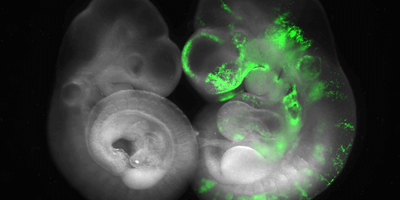Login
Subscribechimera

Cancer Researcher Beatrice Mintz Dies at 100
Natalia Mesa, PhD | Jan 20, 2022 | 2 min read
Mintz’s experiments over her six-decade career were foundational to cancer and genetics research.
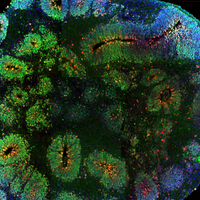
New Report Dissects Ethics of Emerging Human Brain Cell Models
Amanda Heidt | Apr 12, 2021 | 5 min read
The National Academies’ report touches on ethical issues raised by new technologies such as brain organoids and human-animal chimeras, and suggests that current regulatory oversight is sufficient.
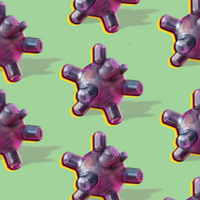
What Pseudoviruses Bring to the Study of SARS-CoV-2
Amanda Heidt | Feb 16, 2021 | 7 min read
Engineered viruses that don’t replicate provide a tractable model for scientists to safely study SARS-CoV-2, including research into vaccine efficacy and emerging variants.
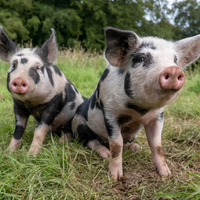
Majority of Respondents Support Chimeric Animal Research: Survey
Amanda Heidt | Oct 1, 2020 | 4 min read
Almost 60 percent of people in a new study on attitudes in the US felt comfortable using animals to grow human organs from induced pluripotent stem cells.
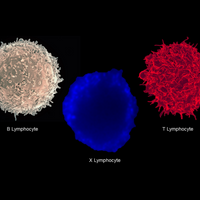
The Science News that Shaped 2019
Kerry Grens | Dec 20, 2019 | 6 min read
A T cell discovery, “hachimoji” DNA, a new species of human, and mounting fears of espionage rounded off the list this year.

Opinion: Develop Organoids, Not Chimeras, for Transplantation
John D. Loike and Robert Pollack | Oct 1, 2019 | 4 min read
Scientists are devising human-animal hybrids for harvesting human organs, but lab-derived mini-organs are a less ethically fraught solution to meeting the need for transplantation.
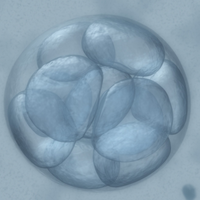
First Human–Monkey Chimeras Developed in China
Nicoletta Lanese | Aug 5, 2019 | 3 min read
The researchers aim to grow transplantable human organs from primate embryos.

Bioethicists Concerned over Japan’s Chimera Embryo Regulations
Katarina Zimmer | Apr 4, 2019 | 5 min read
Many researchers see the move to relax the rules as a welcome change, yet some are worried the revisions don’t take public concerns enough into consideration.

Discovery’s Crest: A Profile of Marianne Bronner
Anna Azvolinsky | Dec 1, 2018 | 8 min read
Studying how neural crest cells journey through the embryo, this Caltech developmental biologist has revealed how they form major cell types, including peripheral neurons, bone, and smooth muscle.

Opinion: Should Human-Animal Chimeras Be Granted “Personhood”?
John D. Loike | May 23, 2018 | 4 min read
Determining which products of advanced biotechnology are deserving of legal protections is essential to our own social architecture.

Scientists Create First Human-Pig Chimeric Embryos
Diana Kwon | Jan 26, 2017 | 4 min read
While the hope is to one day grow organs for transplantation into people, several technical and ethical challenges remain.

Chimeric Pancreas Treats Diabetes in Mice
Tracy Vence | Jan 25, 2017 | 1 min read
Researchers produce functional organs composed of both mouse and rat cells.

Famed Mammalian Embryologist Dies
Jef Akst | Dec 1, 2016 | 2 min read
Andrzej Tarkowski’s research laid the groundwork for future advances in cloning, stem cell research, and in vitro fertilization.

NIH Reveals Plan to Fund Human-Animal Chimeras
Kerry Grens | Aug 4, 2016 | 2 min read
The public gets to weigh in before the US government lifts its ban on such research.

The Human Touch
Kate Yandell | Aug 1, 2015 | 10 min read
Can mice with humanlike tissues better model drug effects in people?

When Does a Smart Mouse Become Human?
John D. Loike | Jul 1, 2015 | 3 min read
Ethical issues attend the creation of animal-human chimeras.

Anatomical Mashups
Sabrina Richards | Nov 15, 2012 | 4 min read
Artist Brian Andrews uses human and veterinary x-rays to create haunting animated hybrids.
World’s First Chimeric Monkeys
Jef Akst | Jan 5, 2012 | 1 min read
Researchers have bred monkeys derived from six different monkey parents.
Opinion: Animals with Human Material
Martin Bobrow | Sep 21, 2011 | 3 min read
Careful oversight is required to ensure that chimeras and transgenic animals continue to serve as powerful biomedical research tools.
